OOP for
Object Haters
socketwench.github.io/OOPforObjectHaters

Grrr! Objects!
What was wrong with functions?
Nothing!
(Well, almost nothing.)
What Functions Do Well
Easy to write and use.
"Assembly line" code.
When Functions Aren't Enough
No simple way to extend
No easy way to encapsulate state
PHP Doesn't Enforce Discipline
No struct leads to Arrays Of Doom.
Weak typing makes testing, documentation hard.
"I'm lost in a maze of classes all alike."
Larger structures harder to see.
Functions (and hooks) are a golden hammer.
"I shouldn't need a 400MB IDE to code!"
You don't, but it helps.
Bad IDEs can reflect poorly on the language.
"I hate this fsck'ing language!"
Bad initial experience can taint a language.
Bad Languages to Learn From
C++ has weirder, less modern OOP.
Java is a little too object happy...
PHP4 wasn't even finished. Ugh!
Abstractions vs. Concretions
"The School of Athens"
Raphael, 1511
Ideal Form
Abstract, only exists in your mind
Represents a class of real things
Real Objects
Physical and "concrete"
May differ from the ideal...
...but identifiable as part of the same class
Programming Plato
Defining the Platonic Chair
class Chair;
Inheritance
Extends the parent, or "base" class
Child class "inherits" aspects from the parent
Extending the Chair Class
class ComfyChair extends Chair;
class OfficeChair extends Chair;
class WeirdChair extends Chair;
IS_A Relationship
Child class is a decedent of parent class

Robot Blueprints
Defining Classes
class Robot {
// More stuff here.
}
Properties
"Class Variables"
Encapsulates state in the class
Defining Class Variables
class Robot {
protected $myVariable = 'Initial Value.';
}
Access Specifier
Precedes a property definition
public, private, or protected
"public" Specifier
Child classes inherit the property
Everyone can read & write the property
"private" Specifier
Child classes do not inherit the property
No one but the defining class can see or use it
"protected" Specifier
Property stays "within the family".
Unrelated classes do not see or have it.
Drawing Properties
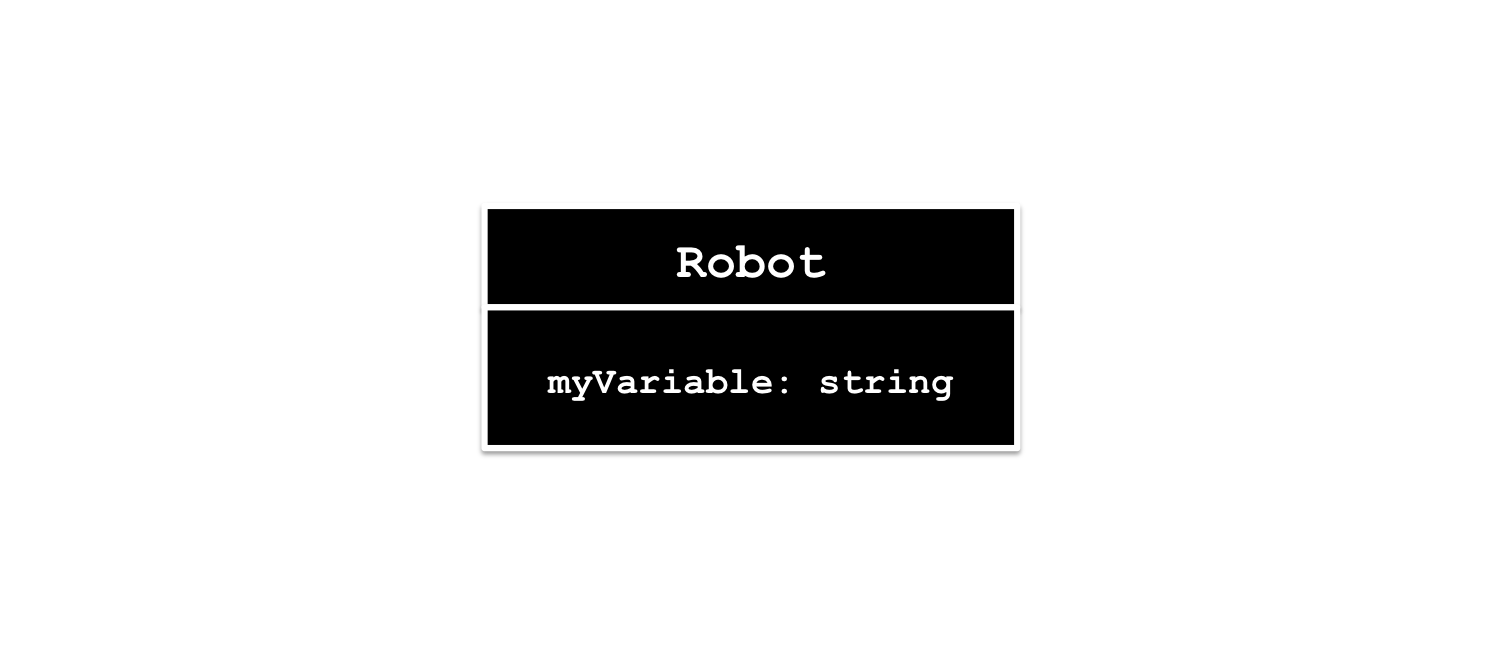
Classes Can Be Properties Too!
Define them like you would any other variable
class Battery {}
class Robot {
protected $battery;
}
HAS_A Relationship
Hosting class possesses hosted class
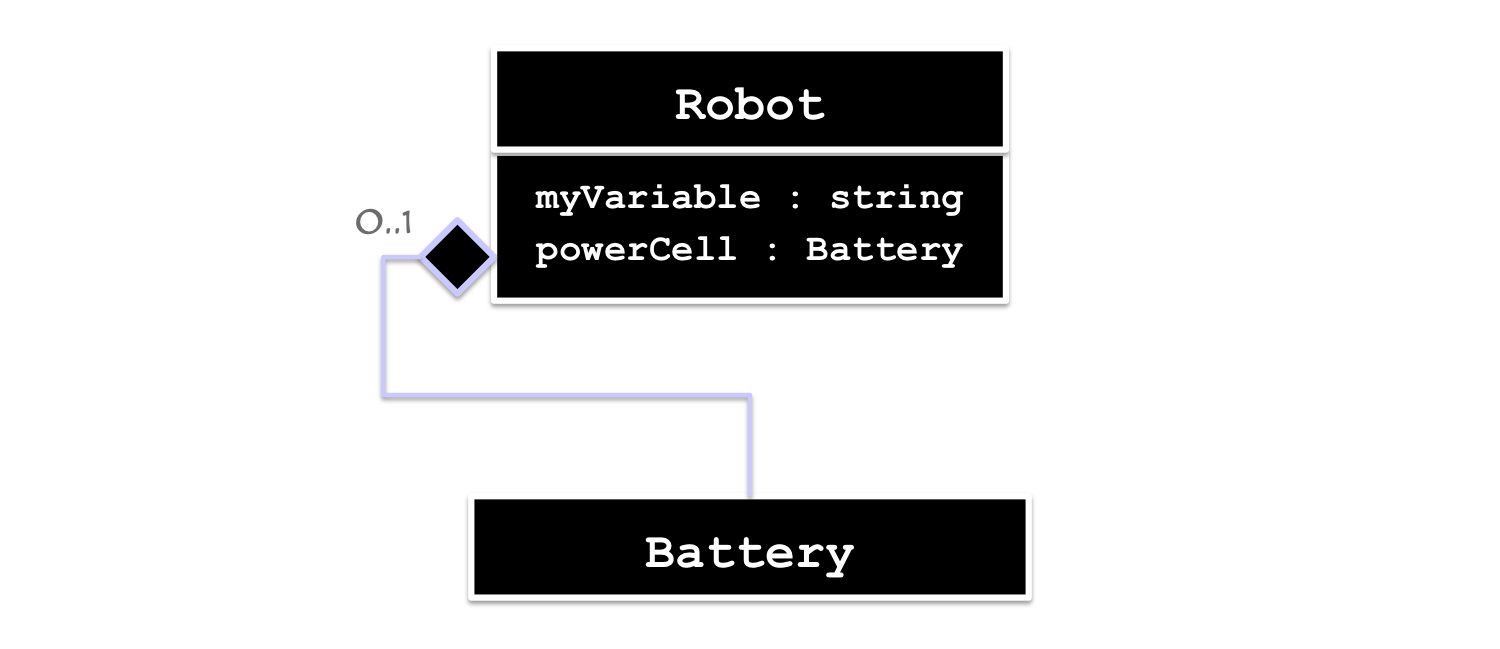
Making your Robot Go
Methods
"Class Functions"
Gives the class knobs and buttons
Defining Methods
class Robot {
public function myMethod($param) {
// Method body
}
}
Access Specifies for Methods
Controls who can call, not see.
Who ya gonna (allow) to call?
public = Everyone
private = Methods in the same class
protected = Only classes in the same family
Special Methods
Plays a special role in the language
Constructors
"Returns" an object of the class' type
May have parameters like other methods
class Robot {
public function __construct($someOption = NULL) {
// Build the object.
}
}
Drawing Methods
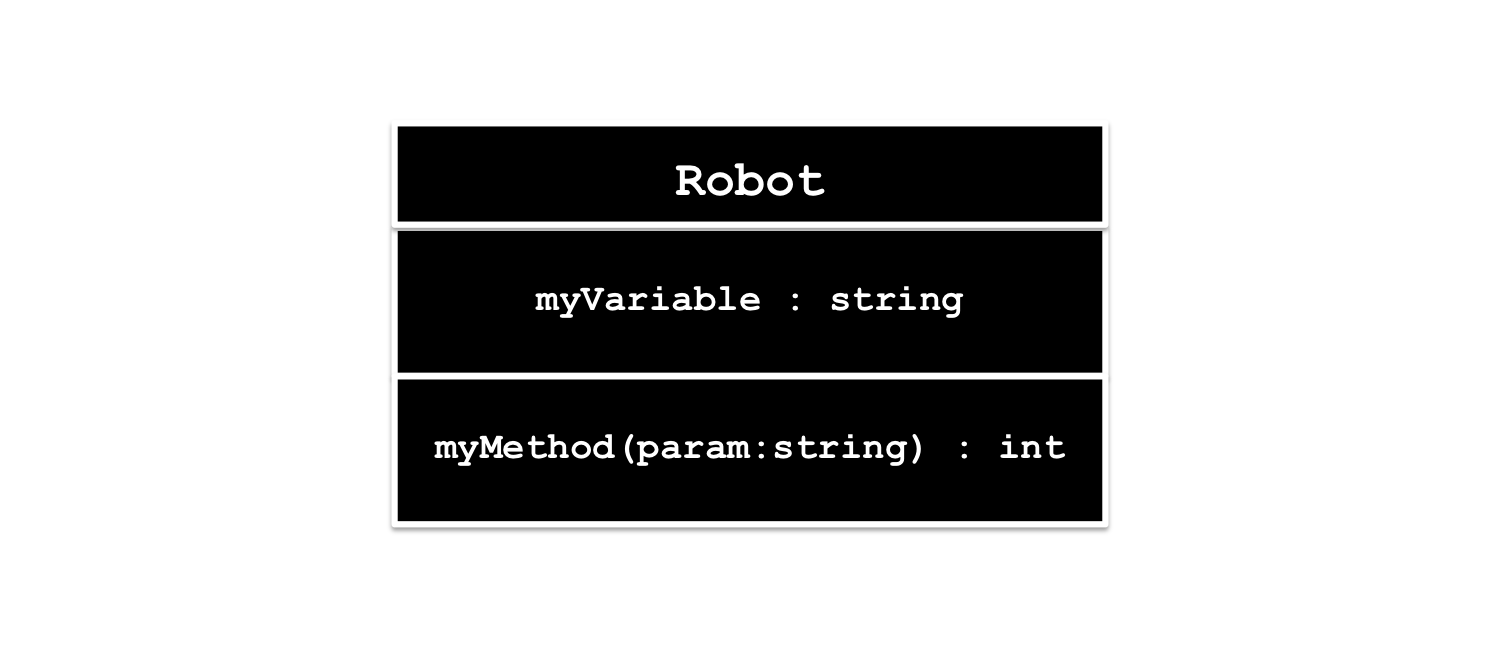
Building Robots
Classes are Blueprints for Objects
They're used to build your house, not be your house
Objects Live in Memory
Classes are defined in your code
One class = zero or more objects
Creating Objects
"Instantiating a class"
$myRobot = new Robot();
$otherRobot = new RobotBatteriesNotIncluded($battery);
"new" Keyword
Calls the class's constructor method
"returns" a new object
Using Objects
-> or "arrow" operator
$myRobot->myVariable = 'Some other value.';
$myRobot->myMethod($param);
Using Properties in Methods
class Robot {
public function setMyVariable($param) {
$this->$myVariableName = $param;
}
public function getMyVariable() {
return $this->myVariableName;
}
}
Talking to Yourself
$this keyword
Refers to object that owns the method
Robot Hierarchies
Doing Things Differently
$normalGhost->slime($ghostBuster);
$slimer->slimeLots($ghostBuster);
But in use
switch(get_class($unknown_ghost)) {
case "Ghost":
$unknown_ghost->slime($ghostBuster);
break;
case "Slimer":
$unknown_ghost->slimeLots($ghostBuster);
break;
}
Method Overloading
class Ghost {
public function slime($ghostBuster) {
// Normal slime.
}
}
class Slimer extends Ghost {
public function slime($ghostBuster) {
// Lots more slime!
}
}
"parent" Keyword
Refers to the current class' parent class.
Not a variable! Must be accessed statically.
"::" Operator
Like ->, but static
Accesses the class, not the object
Extending, Not Reimplementing
class Slimer extends Ghost {
public function __construct() {
$color = 'green';
parent::__construct($color);
}
}
Works on any method!
Abstract Methods
All classes in this family should do this...
...but each does it completely differently.
Defining an Abstract Method
class Ghost {
abstract public function frighten($person);
}
Abstract Classes
Abstract method = abstract class.
abstract class Ghost {
abstract public function frighten($person);
}
Polymorphism
Fancy word for "same name, different action".
Doodling and Diagrams
Unified Modeling Language (UML)
General software engineering modeling language
Not OOP specific, but really useful
UML is HUGE
So...don't diagram everything
Only the parts where a picture would help
Class Diagrams
Visualizes what a class is made of
How classes relate structurally to each other
Sequence Diagrams
Visualize when objects are created/destroyed
When and what classes "say" to each other
Moar UML!
http://www.uml.org/
Contractual Robots
Let's Make a Contract
You to do something
I agree to only ask you to do things you can do
Interfaces
Like a class, but lighter
Can't be created by itself, but implemented by classes
Defining Interface
interface AstroMech {
public function beepBoop();
protected function navigateXwing($coordinates, $speed);
}
Interfaces have no properties
They only define what they can do...
...not how they do it or what they did.
Interface Methods
No method body
Define params as normal
Using Interfaces
implements keyword
class R2DTwo extends BaseDroid implements AstroMech {
...
}
Why!?
You can only inherit once...
...but implement multiple interfaces!
class ThreeCPO implements ProtocolDroid, LoadLiftProgrammer {
...
}
IS_A, HAS_A, DOES_A
What an object can do is more important
Define a completely different class "lineage"
Excellent place for documentation
Interfaces ♥ Type Hinting
Now you only depend on the interface, not class
function myFunction(AstroMech $droid) {
// Do something.
}
Extending Interfaces
extends keyword, just like classes
interface R2Droid extends AstroMech {
public function hide($lightsaber);
}
Drawing Interfaces
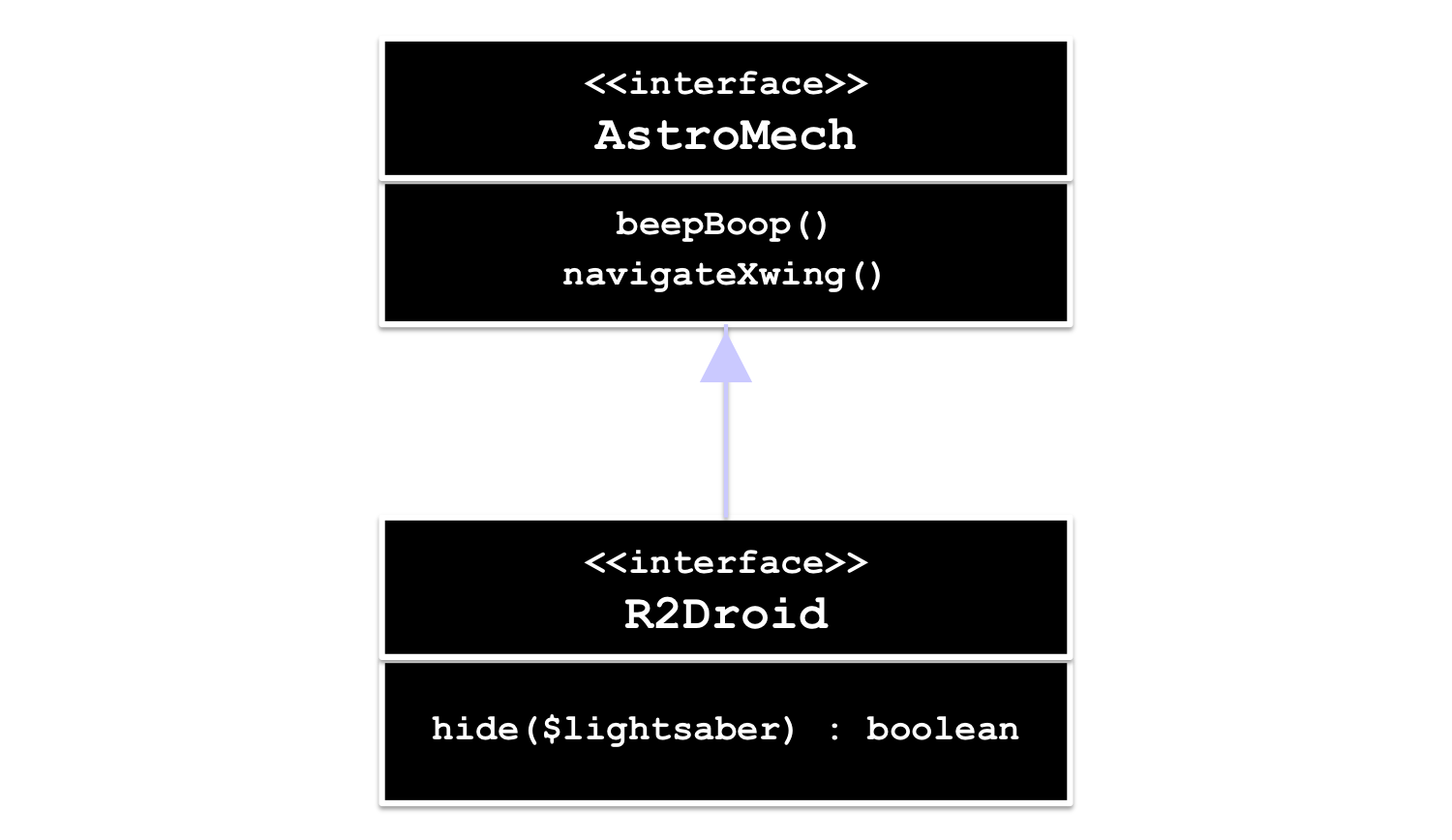
Playing Nice With Other Robots
Namespaces
Puts classes into a named box
Names need be only unique in each box
Using Namespaces in PHP
$myDate = new \MacLeod\Date();
$yourDate = new \Kurgan\Date();
Defining Namespaces
<?php
namespace \Movies\Highlander;
Must be the first line!
Importing
use \Really\Long\Namespaced\Class\Name;
$myName = new Name();
Aliasing
Imports class and gives it a new name
use \Movies\Highlander\Kurgan\Date as BadGuy;
$myVar = new BadGuy();
Structuring Your Project
Blanket Disclaimer
Each language does it differently
Some common patterns have emerged
One class per file
File name same as your class
File Extension
Use your languages normal extension
No *.inc for PHP
Directories
Match your namespaces
Nested namespace = nested directory
$myDate = new \Movies\Highlander\MacLeod\Date();

Root Namespace Directory
Conventions differ between languages and communities
Modern PHP uses <project_dir>/src
Working In OOP
Think in Conversations
Not in steps
Don't Fear the Whiteboard!
A little UML goes a long way
Please use an IDE!
Find one you don't hate immediately
Love Your Documentation
Helps find what you need faster
Let Go
You don't need to keep it all in your head
Further Reading
Design Patterns by Erich Gamma et. al
Thank you!
socketwench.github.io/OOPforObjectHaters
Background by Artwyrd